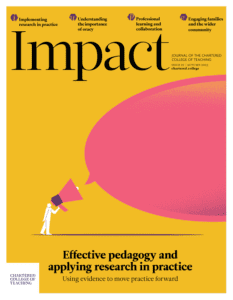Optimal strategies: Towards a research-synthesis model for effective classroom task selection in secondary schools
Written by: Robin Bevan

9 min read
Dr Robin Bevan FCCT, Headteacher, Southend High School for Boys, UK
The choice of classroom activities
Curriculum design tends, rightly, to focus on determining a coherent developmental sequencing of content with an associated progression in knowledge, understanding and skills (e.g. Wiliam, 2013). Teachers, however, still tend to find themselves with a relatively free choice regarding the activities for their classes. Choices about which types of classroom activity are most effective are hard.
In my experience, there is a natural tendency for teachers to select classroom activities that are convenient, not least because workload constraints limit the time to consider what might ‘work best’ with an evidence base to support that reflection. Teachers may simply draw on an existing published resource (e.g. textbook exercises or worksheets) or their own previous teaching experience and preferences, with a leaning towards what is ‘tried and tested’. Decisions also, rightly, may
Join us or sign in now to view the rest of this page
You're viewing this site as a guest, which only allows you to view a limited amount of content.
To view this page and get access to all our resources, join the Chartered College of Teaching (it's free for trainee teachers and half price for NQTs) or log in if you're already a member.
- Alexander R (2018) Developing dialogic teaching: Genesis, process, trial. Research Papers in Education 33(5): 561–598.
- Bevan RM (2006) Turbulent flow into smooth streams: Transferring research knowledge between academic environments and practitioner contexts. Reflecting Education 2: 55–72.
- Black P and Wiliam D (2010) Inside the black box: Raising standards through classroom assessment. Phi Delta Kappan 92(1): 81–90.
- Cowan N (2014) Working memory underpins cognitive development, learning, and education. Educational Psychology Review 26: 197–223.
- Dehn MJ (2011) Working Memory and Academic Learning: Assessment and Intervention. New Jersey: John Wiley & Sons.
- Hall R and O’Donnell A (1996) Cognitive and affective outcomes of learning from knowledge maps. Contemporary Educational Psychology 21: 94–101.
- Horton P, McConney A, Gallo M et al. (1993) An investigation of the effectiveness of concept mapping as an instructional tool. Science Education 77(1): 95–111.
- Hyerle DN and Alper L (eds) (2011) Student Successes with Thinking Maps®: School-Based Research, Results, and Models for Achievement Using Visual Tools. Thousand Oaks, CA: Corwin Press.
- Kellogg RT and Whiteford AP (2009) Training advanced writing skills: The case for deliberate practice. Educational Psychologist 44(4): 250–266.
- Lehtinen E, Hannula-Sormunen M, McMullen J et al. (2017) Cultivating mathematical skills: From drill-and-practice to deliberate practice. ZDM 49: 625–636.
- Tindall-Ford S, Chandler P and Sweller J (1997) When two sensory modes are better than one. Journal of Experimental Psychology: Applied 3(4): 257.
- Undorf M (2020) Fluency illusions in metamemory. In: Cleary AM and Schwartz BL (eds) Memory Quirks: The Study of Odd Phenomena in Memory. New York: Routledge/Taylor & Francis Group, pp. 150–174.
- Ventista OM (2017) A literature review of empirical evidence on the effectiveness of Philosophy for Children. In: Duthie E, Moriyón FG and Loro RR (eds) Parecidos de Familia: Propuestas Actuales en Filosofía para Niños (Family Resemblances: Current Proposals in Philosophy for Children). Madrid: Anaya Educación, pp. 448–461.
- Wiliam D (2011) Embedded Formative Assessment. Solution Tree Press.
- Wiliam D (2013) Principled Curriculum Design. London, UK: SSAT (The Schools Network).
- Zulkifli H and Hashim R (2020) Philosophy for children (P4C) in improving critical thinking in a secondary moral education class. International Journal of Learning, Teaching and Educational Research 19(2): 29–45.
0
0
votes
Please Rate this content
Subscribe
Please login to comment
0 Comments
Oldest
Newest
Most Voted
Inline Feedbacks
View all comments










